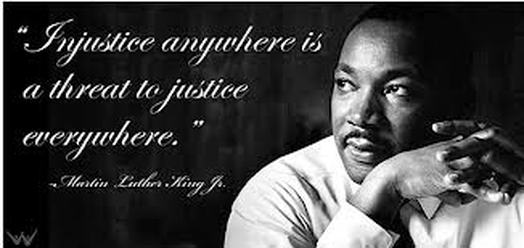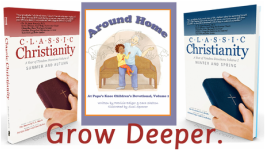
It has been ten years ago, now, I suppose. Martin Luther King Day was approaching, and I had been trying to figure out how to make the whole subject of civil rights real to my kids. White kids, raised in California like their parents, what do they know of prejudice? I knew that even in the 70’s I had never understood civil rights. I had friends at school who were black, brown, yellow, and white; everything seemed fine in my very limited bubble of a world.
If I, right at the tail of the civil rights moment, could be so clueless, I knew my children needed specific teaching. As an adult, I had lived in for three years in a place where racism was alive and well. That experience shook me, opened my eyes to things I had never been in a position to see before. No, this I would not allow them to simply “catch” by my example and words. I wanted them to see and hear and understand to the best of their ability what dream it was that Dr. King dreamt.
Calling around, I found several marches scheduled. I kept calling. Finally - The Second Missionary Baptist Church in a neighboring city was holding a praise and memorial service to “Honor the Man and Worship his Lord and Ours.” The advertisement said that the elders in the church were going to speak about their experiences with segregation.
Loading up my kids, and the one friend each they were allowed to invite, we headed out to church that Monday. The choir was in full-swing, even though we arrived early, and my kids’ eyes were as big as saucers as the choir sang to raise the rafters, with the whole congregation on its feet, clapping along.
After the singing, the littlest members of the church recited the “I Have a Dream” speech – the cutest rendition ever. But then the real service began, in my mind. One by one, for probably two hours, people came up front and through tears of remembrance told their stories.
One lady had been, with her sister, among the first African-American students to integrate Oklahoma City High School. Escorted by the National Guard, she walked a gauntlet of hurled epithets that whole first week, just to get in the door. She talked about being spat on, yelled at, about how she was terrified her entire first two years at that school. After she sat down, a man – a local professor – told about how he was raised down south with separate drinking fountains, separate restrooms, separate everything. He remembered having to sit in the balcony of the movie theatre. As tears streamed down his face, he shook his head, “You would think it wouldn’t be so painful now,” he said, as he recalled being beaten for racing into the wrong restroom when he had been just 8 years old, and in the kind of desperate need only an 8 year old can know.
Wide eyed, my kids kept looking at me. The quizzical looks in their eyes were answered by my nod – and my pointed finger – Look, Listen, Hear. The shock they felt, near disbelief, was visible on their silent faces as they heard each individual tale. Why didn’t they call the police? Why didn’t the government DO something? Why? Just because they were black? One by one, we heard their painful, embarrassing, heart-wrenching stories. Filled with pain undimmed by passing years, the realities of prejudice were laid bare. I looked around and realized that this church had really hit on a key concept – the passing down of history through generations. I realized that it was not just my little white kids who were hearing this all for the first time, but that younger generations of black families, too, were sitting entranced, hardly able to absorb all they were hearing.
After the service, the pastor and some of the older people who had been speaking sought us out. They came with cameras in hand, asking if we would take a picture with them. I couldn’t understand – why? I looked around again and realized we were the only white people there that day. Embarrassed, we stood for pictures. Embarrassed, we left. The ride home was silent for a few minutes, but then the barrage of questions started. I mark that day as the first day my children began to understand who Martin Luther King, Jr. was and what his “Dream” means for all of us.
As time passes, we are losing the generations who can tell us of their own experiences with integrating schools, with voting rights struggles, with the prejudice and the ignorance that reveal the very worst in human nature. Now is the time. Ask questions of your elders, video tape their answers for the future. Together, we need to hear their stories, so that together we can say, “Never again.”
During the civil rights movement of the turbulent 60’s, Rev. Meade said this:
We foolishly think we become superior when we try to keep another in an inferior position. Thus Japan oppressed the Chinese. Thus Germany annihilated six million Jews. Thus we have sinned against our black brothers. As Christians we must realize that unbrotherliness destroys not only our bodies, but our souls. The victim of a lynching dies physically, but in so torturing him, his crucifiers kill that which is human in themselves. The person who through discrimination seeks to keep another in an inferior position, lowers himself instead.
Brotherhood is a law, the law of God. “You shall love your neighbor as yourself.” We cannot hold this issue in abeyance any longer. God is no respecter of persons. In His sight we are all children of the same family. I must be a Christian first, not a white man, or a black man, or any other sort of man. The one hope for fellowship, for peace in this world of division, is the Spirit of Christ working in the hearts of all God’s children. Would to God it may begin today.
Amen!
Blessings to you and yours,
Cara and Patti
Classic Christianity

 RSS Feed
RSS Feed